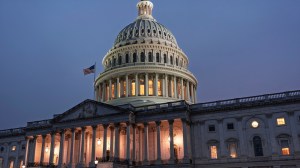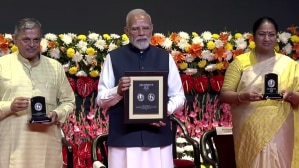Five months after hijack, knives can still enter aircraft from
KATHMANDU, MAY 21: It's now almost five months since the nightmare of IC-814 hijack ended. Indian Airlines is set to resume its flights to...

KATHMANDU, MAY 21: It’s now almost five months since the nightmare of IC-814 hijack ended. Indian Airlines is set to resume its flights to Nepal, suspended after the hijack. But the staff at Kathmandu’s Tribhuvan International Airport are still struggling to handle the long queues of passengers, leading to security slip-ups.
Officials in Nepal, which has lost crores in trade with India in the past five months, vouch for security at the airport, cite double X-Ray of passengers’ luggage, segregation of incoming and outgoing passengers and increased frisking. They are right, all these are done, but still the traffic is more than they can handle.
After the check-in and hand baggage is X-rayed twice, as informed, the passengers almost jostle to get into the aircraft, with the staff at the counter barely looking at the overstuffed hand baggage. Despite a clear warning that knifes, cigarette lighters and cells in the camera are not allowed into the aircraft, almost everyone in a group of journalists from India got away with khukris (small knives) — gifted as a souvenir — without anyone getting wind of it.
Nepal’s Director General of Civil Aviation Nagendra Ghimire says the departure area has been sterilised, which means after the security check, the passengers cannot go out. He adds that the earlier mixing of incoming and outgoing passengers — which had caused much consternation after the hijack — is no longer permitted. He informs that a computerised pass system will be introduced shortly. “We are also using binding tapes for checked baggage so that they cannot be tampered with,” he says.
The feeling in Nepal, however, is that security is the responsibility of both the airlines and the airport authorities. It is for the airlines to seek and provide more security, says Kishore R. Pandey, MD of Keyman Pvt Ltd which looks after the management of several hotels in Nepal. He points out that the Pakistan Airlines has its own staff doing the frisking.
Pradeep Raj Pandey, CEO of Nepal Tourism Board, says it is not possible to frisk all the 5,000 passengers at the same time. Nor can the presence of a large number of policemen alone help. He emphasises that the passengers’ baggage is handled by the airlines, adding that something can go wrong at that stage too. But he is cautious to add that it’s more of a matter between the airport and the airlines than the two countries.
He says things can be made better by employing modern equipment for greater security. He points out that security can also be a hassle to some “safe” airlines, saying Singapore Airways has objected to its passengers being subject to strict security measures.
Pandey goes on to say that security at the Nepal airport is sufficient, but there is always scope for improvement. He points out that the hijack has been the only incident involving Nepal since 1952, which can by no means be described as high incidence. He sees the media reaction to the hijack as a disinformation campaign. India “reacted emotionally at the time of heat”, he laments.
Deepmani Rajbhandari, CMD of Necon Air, a premier airlines operating in Nepal which flies to Patna and plans to add flights to Lucknow and Varanasi, feels the aviation authorities in the country have taken steps to enhance security, and the government feels things are looking up.
That Nepal is a safe place, Ghimire says, is substantiated by the fact that 7,000 to 8,000 passengers are still visiting the country.
While the government is being grilled over security measures, there is a mixed feeling among the people. There’s a lot of security now, says Shabnam, a Nepali national, who was on the hijacked flight, at the IGI airport. For her, travel on the route is a must as she has a house in Karol Bagh and her children are studying in India. But she seems apprehensive. “Why are so many of you travelling together,” she asks.
“Security has been beefed up,” says Bharat Chhajed, a cloth merchant in Ahmedabad whose family has been doing business in India for the past 40 years.
At the Tribhuvan airport, Promila Bij, who is in the beauty business and travels frequently to Mauritius, France and London, says the security standards abroad are much higher. She points out she was once taking a Rajasthani bangle for a friend in France and had to do a lot of explaining at the airport about its exclusive thickness. Her husband, Arun K Bij, is peeved that he had to pay a bribe of 20 Nepalese rupees to an airport staffer while going to Pokhara from Kathmandu, for carrying a match-box.
Fore some others, it’s getting a bit too much. Bruce Moore, the Australian GM of the picturesque Fulbari resort at Pokhara, says it was a nightmare for him travelling on the Kathmandu-Delhi-Mumbai route in February. He was frisked several times over, which left him disgusted.
Most of the foreigners, though, are not concerned about safety. Cynthia, who has come to Pokhara from Canada as part of her forest management job, says a hijacking incident can happen anywhere. Jonas from Sweden also says he did not give the hijack a thought, but he certainly isn’t going to Kashmir.
(The reporter was a guest of Nepal Tourism Board)



- 01
- 02
- 03
- 04
- 05




























